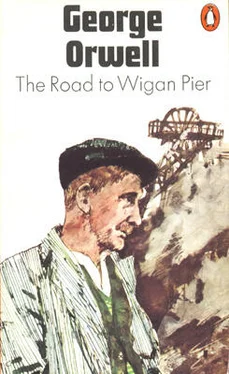George Orwell - The Road to Wigan Pier
Здесь есть возможность читать онлайн «George Orwell - The Road to Wigan Pier» весь текст электронной книги совершенно бесплатно (целиком полную версию без сокращений). В некоторых случаях можно слушать аудио, скачать через торрент в формате fb2 и присутствует краткое содержание. Жанр: Классическая проза, на английском языке. Описание произведения, (предисловие) а так же отзывы посетителей доступны на портале библиотеки ЛибКат.
- Название:The Road to Wigan Pier
- Автор:
- Жанр:
- Год:неизвестен
- ISBN:нет данных
- Рейтинг книги:5 / 5. Голосов: 1
-
Избранное:Добавить в избранное
- Отзывы:
-
Ваша оценка:
- 100
- 1
- 2
- 3
- 4
- 5
The Road to Wigan Pier: краткое содержание, описание и аннотация
Предлагаем к чтению аннотацию, описание, краткое содержание или предисловие (зависит от того, что написал сам автор книги «The Road to Wigan Pier»). Если вы не нашли необходимую информацию о книге — напишите в комментариях, мы постараемся отыскать её.
Эссе Оруэлла всегда умные, изысканно-злые и в чем-то парадоксальные.
Сейчас, как и в прошлом, многим они кажутся спорными и «скандальными». Почему? Да потому, что Джордж Оруэлл всегда современен!
The Road to Wigan Pier — читать онлайн бесплатно полную книгу (весь текст) целиком
Ниже представлен текст книги, разбитый по страницам. Система сохранения места последней прочитанной страницы, позволяет с удобством читать онлайн бесплатно книгу «The Road to Wigan Pier», без необходимости каждый раз заново искать на чём Вы остановились. Поставьте закладку, и сможете в любой момент перейти на страницу, на которой закончили чтение.
Интервал:
Закладка:
The job of the thinking person, therefore, is not to reject Socialism but to make up his mind to humanize it. Once Socialism is in a way to being established, those who can see through the swindle of ‘progress’ will probably find themselves resisting. In fact, it is their special function to do so. In the machine-world they have got to be a sort of permanent opposition, which is not the same thing as being an obstructionist or a traitor. But in this I am speaking of the future. For the moment the only possible course for any decent person, however much of a Tory or an anarchist by temperament, is to work for the establishment of Socialism. Nothing else can save us from the misery of the present or the nightmare of the future. To oppose Socialism now , when twenty million Englishmen are underfed and Fascism has conquered half Europe, is suicidal. It is like starting a civil war when the Goths are crossing the frontier.
Therefore it is all the more important to get rid of that mere nervous prejudice against Socialism which is not founded on any serious objection. As I have pointed out already, many people who are not repelled by Socialism are repelled by Socialists. Socialism, as now presented, is unattractive largely because it appears, at any rate from the outside, to be the plaything of cranks, doctrinaires, parlour Bolsheviks, and so forth. But it is worth remembering that this is only so because the cranks, doctrinaires, etc., have been allowed to get there first J if the movement were invaded by better brains and more common decency, the objectionable types would cease to dominate it. For the present one must just set one's teeth and ignore them; they will- loom much smaller when the movement has been humanized. Besides, they are irrelevant. We have got to fight for justice and liberty, and Socialism does mean justice and liberty when the nonsense is stripped off it. It is only the essentials that are worth remembering. To recoil from Socialism because so many individual Socialists are inferior people is as absurd as refusing to travel by train because you dislike the ticket-collector's face.
And secondly, as to the Socialist himself — more especially the vocal, tract-writing type of Socialist.
We are at a moment when it is desperately necessary for left-wingers of all complexions to drop their differences and hang together. Indeed this is already happening to a small extent. Obviously, then, the more intransigent kind of Socialist has now got to ally himself with people who are not in perfect agreement with him. As a rule he is rightly unwilling to do so, because he sees the very real danger of watering the whole Socialist movement down to some kind of pale-pink humbug even more ineffectual than the parliamentary Labour Party. At the moment, for instance, there is great danger that the Popular Front which Fascism will presumably bring into existence will not be genuinely Socialist in character, but will simply be a manoeuvre against German and Italian (not English) Fascism. Thus the need to unite against Fascism might draw the Socialist into alliance with his very worst enemies. But the principle to go upon is this: that you are never in danger of allying yourself with the wrong people provided that you keep the essentials of your movement in the foreground. And what are the essentials of Socialism? What is the mark of a real Socialist? I suggest that the real Socialist is one who wishes — not merely conceives it as desirable, but actively wishes — to see tyranny overthrown. But I fancy that the majority of orthodox Marxists would not accept that definition, or would only accept it very grudgingly. Sometimes, when I listen to these people talking, and still more when I read their books, I get the impression that, to them, the whole Socialist movement is no more than a kind of exciting heresy-hunt — a leaping to and fro of frenzied witch-doctors to the beat of tom-toms and the tune of ‘Fee fi, fo, fum, I smell the blood of a right-wing deviationist!’ It is because of this kind of thing that it is so much easier to feel yourself a Socialist when you are among working-class people. The working-class Socialist, like the working-class Catholic, ‘s weak on doctrine and can hardly open his mouth without uttering a heresy, but he has the heart of the matter in him. He does grasp the central fact that Socialism means the overthrow of tyranny, and the ‘Marseillaise’, if it were translated for his benefit, would appeal to him more deeply than any learned treatise on dialectical materialism. At this moment it is waste of time to insist that acceptance of Socialism means acceptance of the philosophic side of Marxism, plus adulation of Russia. The Socialist movement has not time to be a league of dialectical materialists; it has got to be a league of the oppressed against the oppressors. You have got to attract the man who means business, and you have got to drive away the mealy-mouthed Liberal who wants foreign Fascism destroyed in order that he may go on drawing his dividends peacefully — the type of hum-bug who passes resolutions ‘against Fascism and Communism’, i.e. against rats and rat-poison. Socialism means the overthrow of tyranny, at home as well as abroad. So long as you keep that fact well to the front, you will never be in much doubt as to who are your real supporters. As for minor differences — and the profoundest philosophical difference is unimportant compared with saving the twenty million Englishmen whose bones are rotting from malnutrition — the time to argue about them is afterwards.
I do not think the Socialist need make any sacrifice of essentials, but certainly he will have to make a great sacrifice of externals. It would help enormously, for instance, if the smell of crankishness which still clings to the Socialist movement could be dispelled. If only the sandals and the pistachio-coloured shirts could be put in a pile and burnt, and every vegetarian, teetotaller, and creeping Jesus sent home to Welwyn Garden City to do his yoga exercises quietly! But that, I am afraid, is not going to happen. What is possible, however, is for the more intelligent kind of Socialist to stop alienating possible supporters in silly and quite irrelevant ways. There are so many minor priggishness which could so easily be dropped. Take for instance the dreary attitude of the typical Marxist towards literature. Out of the many that come into my mind, I will give just one example. It sounds trivial, but it isn't. In the old Worker's Weekly (one of the forerunners of the Daily Worker ) there used to be a column of literary chat of the ‘Books on the Editor's Table’ type. For several weeks miming there had been a certain amount of talk about Shakespeare; whereupon an incensed reader wrote to say, ‘Dear Comrade, we don't want to hear about these bourgeois writers like Shakespeare. Can't you give us something a bit more proletarian?’ etc., etc. The editor's reply was simple. ‘If you will turn to the index of Marx's Capital ,’ he wrote, ‘you will find that Shakespeare is mentioned several times.’ And please notice that this was enough to silence the objector. Once Shakespeare had received the benediction of Marx, he became respectable. That is the mentality that drives ordinary sensible people away from the Socialist movement. You do not need to care about Shakespeare to be repelled by that kind of thing. Again, there is the horrible jargon that nearly all Socialists think it necessary to employ. When the ordinary person hears phrases like ‘bourgeois ideology’ and ‘proletarian solidarity’ and ‘expropriation of the expropriators’, he is not inspired by them, he is merely disgusted. Even the single word ‘Comrade’ has done its dirty little bit towards discrediting the Socialist movement. How many a waverer has halted on the brink, gone perhaps to some public meeting and watched self-conscious Socialists dutifully addressing one another as ‘Comrade’, and then slid away, disillusioned, into the nearest four-ale bar! And his instinct is sound; for where is the sense of sticking on to yourself a ridiculous label which even after long practice can hardly be mentioned without a gulp of shame? It is fatal to let the ordinary inquirer get away with the idea that being a Socialist means wearing sandals and burbling about dialectical materialism. You have got to make it clear that there is room in the Socialist movement for human beings, or the game is up.
Читать дальшеИнтервал:
Закладка:
Похожие книги на «The Road to Wigan Pier»
Представляем Вашему вниманию похожие книги на «The Road to Wigan Pier» списком для выбора. Мы отобрали схожую по названию и смыслу литературу в надежде предоставить читателям больше вариантов отыскать новые, интересные, ещё непрочитанные произведения.
Обсуждение, отзывы о книге «The Road to Wigan Pier» и просто собственные мнения читателей. Оставьте ваши комментарии, напишите, что Вы думаете о произведении, его смысле или главных героях. Укажите что конкретно понравилось, а что нет, и почему Вы так считаете.












